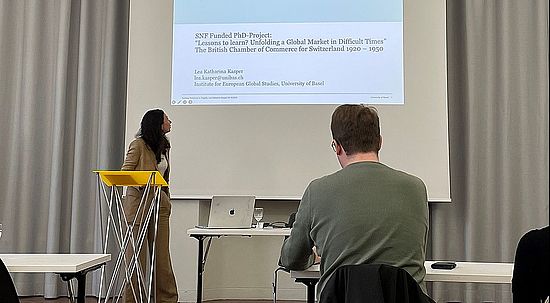/ News, Forschung, Doktorat
Working Lunch with Lea Kasper on the institutional resilience of the British Chamber of Commerce for Switzerland


Lea Kasper presented on the topic of “Building Resilience in Fragility: The British Chamber of Commerce for Switzerland 1920–1950” at the working lunch on 9 October 2024. The event was organized by the Institute for European Global Studies.
Lea’s interdisciplinary PhD-research brings together institutional economics, micro-history, and the digital humanities to investigate the operation and activities of the Basel-based BSCC in the turbulent decades between 1920 and the early 1950s. Initially founded by British diplomats to encourage Swiss imports of British goods in the 1920s, the BSCC instead became a forum of Swiss exporters to Britain. The chamber’s membership consisted overwhelmingly of Swiss companies, although British subjects retained institutional control. After generous initial donations, membership and revenue declined over the 1920s and 30s. The BSCC’s extensive operations (which had included various publications, language classes, and a branch office in Lausanne) were slowly reduced. During the Second World War, the chamber of commerce became a valuable resource to British activities on the continent, facilitating the smuggling of various goods to sustain Britain’s war economy, while aiding member companies to both German and British sanction lists. After the war, membership numbers increased to unprecedented heights, and the renamed British-Swiss Chamber of Commerce exists to this day.
In the course of her presentation, Lea portrayed the BSCC as an example of economic soft infrastructure, facilitating Anglo-Swiss trade by providing information and various quasi-governmental functions to its member companies. Her research also draws on the BSCC and the sources it left behind to study the informal relationships between individual members, companies, and outsiders (like diplomats and trade delegates). Applying digital tools to tens of thousands of data points allows for a much grainier, nuanced picture of trade than can be gleaned from governmental statistics and allows for new perspectives and a new scale of inquiry. It also lays the groundwork to understand how an underfunded, declining institution persisted and rebounded during the Second World War.
Lea Kasper is a doctoral researcher (SNSF Doc.CH) at the EIB with an interest in global and economic history as well as the digital humanities. Her PhD-project, “Lessons to Learn? Unfolding a Global Market in Difficult Times” – The British Chamber of Commerce for Switzerland 1920 – 1950, delves into the history of this multifaceted institution.


